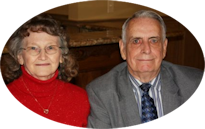
Ed and Patsy now live in Athens, Alabama and are members at the Pepper Road church. As administrator of this blog, he enjoys sharing thoughts about spiritual maters. Not only his thoughts but good articles from other authors. He is also thankful to have been able to preach the unsearchable riches of Christ for over sixty years.
When I was a youngster, it was not unusual to hear people “testifying” and “witnessing” at various denominations’ worship services. During the last several years, we hear the terms used more and more among those with whom I am associated. Such testimony usually consisted of telling of a supernatural “salvation” experience or telling what the Lord allegedly had done for them in general.
In the basic sense of the words, people today are not in a position to “testify” or “witness” for the Lord. They have neither heard, seen, nor touched him as some in the first century had done and were able to be true witnesses. The apostles “testified” or “witnessed” what they had seen, heard, handled as well as messages they received from him through the Holy Spirit. Their testimony was verified to their listeners by the signs and wonders which they did. Today we have to depend on their “testimony” and “witness” in their New Testament writings. We can preach and teach their testimony with confidence because they not only gave but confirmed their testimony by the miracles they did.
“Therefore we must give the more earnest heed to the things we have heard, lest we drift away. For if the word spoken through angels proved steadfast, and every transgression and disobedience received a just reward, how shall we escape if we neglect so great a salvation, which at the first began to be spoken by the Lord, and was confirmed to us by those who heard Him, God also bearing witness both with signs and wonders, with various miracles, and gifts of the Holy Spirit, according to His own will?” (Hebrews 2:1-4 NKJV)
The best that modern day “witnesses” can do is to testify as to how they feel about the Lord and what they feel he may have done for them. Sometimes they testify as to the changes that the Lord has made in their lives. All of this really means nothing without objective evidence. Anyone of any religious persuasion can give this kind of “witness.” They can tell what they feel about the Lord and what they feel his has done for them. They can point to changes in their lives and attribute it the work of the Lord.
This is why it is better for teachers/preachers to spend their time in relaying the testimony of truly confirmed witnesses to their hearers rather giving their own subjective testimony. If one decides to give his own experience, he should give the objective proof (book, chapter, and verse) that he followed to gain his experience. Then we and those who hear us will “built upon the foundation of the apostles and prophets, Jesus Christ himself being the chief corner stone” (Eph. 2:20) rather the subjective claims of modern “witnesses.

We can only speak what we have learned from the faithful witnesses who were inspired. That is what Timothy was told to do. To repeat that which he had learned 2.Tim.2:2. Even the inspired writer of Hebrews understood he was not a personal eyewitness Heb.2:3-4. Thanks for reminding us that we must speak the oracles of God as recorded from those who had received them 1.Pet.4:11.
Excellent article, Ed. Thank you!